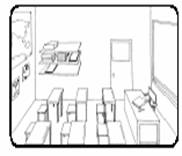
Unit XVII contains a review of the Genitive Case as used with negative sentences and with certain prepositions. The Unit also presents terminology related to school and learning.
| |
Доброго ранку |
Good morning |
| |
Ага! |
Aha! |
| |
Ну, тоді... |
Well, then… |
 |
У розмові ми чуємо: |
Доброго ранку, хлопці і дівчата!
|
 |
|
Ага! Василь та Андрій також забули!
|
 |
|
Ну, тоді ви залишіться після лекції!
|
 |
|
|
Іменники: Родовий відмінок
|
A. Negative Sentences
Recall that the Genitive Case is used after a negative verb (that is, a verb combined with the word не), while the Accusative Case is used as the direct object of an affirmative verb.
The English language does not distinguish between negative and positive verbs in this way. In English, the noun following a negated verb (a verb combined with ‘not’) doesn’t change. Study these examples:
I see Anna. I do not see Anna.
I am buying a car. I am not buying a car.
In Ukrainian, the case ending changes in a ‘negative’ sentence. Study the same examples in Ukrainian.
Я бачу Анну. Я не бачу Анни.
Я купую авто. Я не купую авта.
Let’s review the endings of nouns in the Genitive Case once again in order to strengthen your learning.
Чоловічий рід: All masculine animate noun genitive singular endings are the same as the accusative masculine endings:
| stem + a (Тарас --- Тараса) |
Василь не знає Тараса. |
| й --- я (Сергій --- Сергія) |
Директор не питає Сергія. |
| ь --- я (хлопець --- хлопця) |
Я не запам’ятаю хлопця. |
| о --- а (тато --- тата) |
Ми не побачимо тата завтра. |
There are some exceptions for masculine inanimate nouns. While you are not required to know them, it would be helpful if you could recognize their usage in texts or conversations. These nouns are singular in form, but plural in meaning. They often refer to an undefined quantity, space, quality or span of time.
| stem + у/ю |
| 1. groups of people |
хор --- хору (choir) |
| 2. substances |
мед --- меду (honey) |
| 3. natural phenomena |
дощ --- дощу |
| 4. landscapes, locations |
степ --- степу
Едмонтон --- Едмонтону
Вінніпеґ --- Вінніпеґу |
| 5. human-made structures |
музей --- музею |
| 6. words from other languages |
ґараж --- ґаражу (garage) |
| 7. abstract concepts |
час --- часу |
Жіночий рід:
| а --- и (баба --- баби) |
Ти не маєш баби? |
| я --- і/ї (вечеря --- вечері) |
Хлопці не хочуть вечері. |
Середній рід:
| о --- а (авто --- авта) |
Степан не купить авта. |
| е --- а/я (яйце --- яйця) |
Я не хочу яйця на сніданок. |
There are exceptions to the neuter noun endings in the Genitive Case. Double consonant + я do not change:
завдання = завдання
Ми не робимо домашнього завдання.
 |
У розмові ми чуємо: |
Я не маю свого домашнього завдання у школі.
|
 |
|
Other neuter nouns with this type of ending are used in the sentences below.
| читання (a reading) |
Ми сьогодні не маємо читання від учительки. |
| варення (jam, preserves) |
Баба не варить варення у січні! |
| волосся (hair) |
Той чоловік не має волосся! |
XVII. Exercise 2.ii Complete the exercise as shown in the example. The positive response contains the item shown on a specific day. The negative response contains an item shown on a different day.

| Оксана |
Оксана купить торт у понеділок. |
| |
Оксана не купить хліба у понеділок. |
| 1. мама |
____________________________________________________
|
| |
____________________________________________________
|
| 2. ми |
____________________________________________________
|
| |
____________________________________________________
|
| 3. діти |
____________________________________________________
|
| |
____________________________________________________
|
| 4. Роман |
____________________________________________________
|
| |
____________________________________________________
|
| 5. пан Савчук |
____________________________________________________
|
| |
____________________________________________________
|
| 6. ви |
____________________________________________________
|
| |
____________________________________________________
|
| 7. учитель |
____________________________________________________
|
| |
____________________________________________________
|
| 8. вуйко |
____________________________________________________
|
| |
____________________________________________________
|
| 9. хлопці |
____________________________________________________
|
| |
____________________________________________________
|
10. Наталя |
____________________________________________________ |
| |
____________________________________________________
|
XVIII. Exercise 2.iii To review the use of the Genitive Case in negative sentences, complete the following exercise. Note that both imperfective and perfective verbs are used.
1. Ми /не /побачити /Василь /у /школа.
______________________________________________________________
2. Тарас /не /мати /лопата /удома.
______________________________________________________________
3. Чи /вони /не /знати /Андрій?
______________________________________________________________
4. Діти /не /купити /молоко /у /крамниця.
______________________________________________________________
5. Чи /Марійка /не /написати /лист /до /Оксана?
______________________________________________________________
6. Василь /любити /м’ясо /але /не /любити /риба!
______________________________________________________________
7. Ми /не /мати /час /іти /до /бібліотека /сьогодні.
______________________________________________________________
B. After Certain Prepositions
You have already learned about the Genitive Case and its use after the prepositions до (to) and для (for). Unit XVII introduces you to the preposition після (after) which is also used with the Genitive Case.
 |
У розмові ми чуємо: |
Ну, тоді ви залишіться після лекції!
|
 |
|
Throughout your study of Ukrainian language structures and patterns, you have been encouraged to focus on questioning patterns as a way to determine the case endings needed for the responses. If a preposition appears in the question, it is very easy to structure the response because the preposition becomes part of the answer. Study these examples:
| до |
До кого йде мама? Мама йде до баби.
Куди йде Тереса? Вона йде до крамниці.
До чого треба масла? Треба масла до хліба. |
| |
для |
Для когo ти готуєш сніданок? Я готую сніданок для Івана.
Для чого дід купив цвяхи? Він купив цвяхи для ґаражу. |
| |
після |
Після когo ти йдеш до лазнички? Я йду після Оленки.
Після чого йдемо на концерт? Ми йдемо після лекції. |
One exception to this pattern in the Genitive Case is the question Куди? which is usually reserved for inanimate nouns (i.e. places), while До кого? is used with animate nouns (i.e. people). XVII. Exercise 2.iv
Practise using the Genitive Case after the preposition після by completing each statement.
1. Після обіду ______________________________________________
2. Після спорту _____________________________________________
3. Після вечері _____________________________________________
4. Після концерту ___________________________________________
5. Після лекції ______________________________________________
6. Після школи _______________________________________________
7. Після сніданку _____________________________________________
8. Після волейболу ___________________________________________
9. Після математики __________________________________________
10. Після вечірки ______________________________________________
XVII. Exercise 2.v
Complete the following exercise.
a. Після чого ви йдете на обід до ресторану? (церква)
________________________________________________________________
b. Після кого співає Тереса Сокирка? (бандурист*)
________________________________________________________________
c. Після кого ти йдеш до умивальні? (сестра)
________________________________________________________________
d. Після чого діти можуть іти надвір? (дощ)
________________________________________________________________
e. Після кого відповідає Тарас? (Анна й Андрій)
________________________________________________________________
*бандурист – bandura player
School Vocabulary
You already know many terms related to school as presented in past Units. We will review this vocabulary and add some important new terms to this topic. Notice that many of the words are cognates – they aren't really new at all!

|
школа - директор, учитель, учителька
|
| |
- бібліотека, книжка, словник, журнал, газета, часопис, роман, детектив
- комп’ютер, монітор, мишка, клавіятура
- веб-сайт, файл, е-мейл, пошук, інтернет, е-адреса, е-лист
|

|
кляса - клясна кімната, двері, вікно, стіна, світло
|
| |
- таблиця (дошка), крейда, карта (мапа)
- лекція, парта, крісло, шафа, полиця
- студент, студентка, друзі, одноклясники
- папір, підручник, зошит, список
- олівець, перо, ручка,
- писати, читати, слухати, питати, знати, казати, говорити, відповідати, вчитися, розмовляти, працювати, пам’ятати
|

|
освіта - наука, інформація, знання, навчання
|
| |
- домашнє завдання, домашня робота
- есей, звіт, іспит, презентація
- письмо, писання, читання, відповідь, розмова,
- мова, математика, географія, хімія, фізика, біологія, фізкультура, спів, танці, |
XVII. Exercise 2.vi
Circle or highlight all of the words which are new to you in the three charts given above. Look up the meanings of the new words in a Ukrainian-English dictionary and jot these words and their meanings in the columns below.
школа - school |
кляса – class, grade |
освіта - education |
|
|
|
|
 |
|











